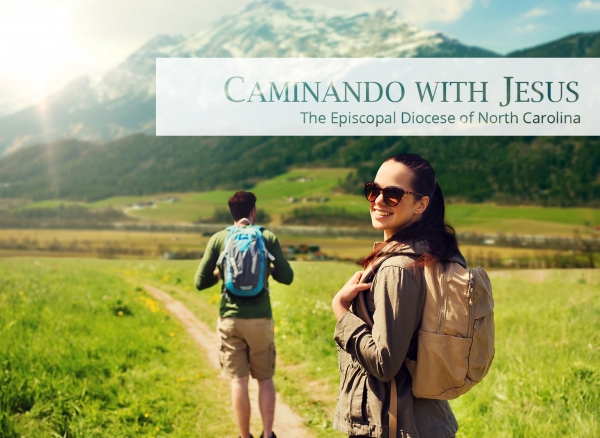CAMINANDO WITH JESUS: Listening, Learning and Doing

When meeting someone for the first time in this part of the world, we often ask a series of questions: Where are you from? Where do you live? Where do you go to church? Married? Children? If you’re not accustomed to this, then it might feel a bit intrusive (particularly that pesky church question). The questions asked are not meant to be rude or pushy. No, just want to get to know you. Just want to know who your people are. Just want to know if we’re related and how the family is doing. So, for me, when my fellow priest first-cousin-once-removed and I see one another, there’s a quick bit of checking in. It is about belonging. It is about being welcomed. It is about knowing that there is someone else with whom there is a connection. This is a profoundly basic human emotional and social need. Even Simon Stylites and Julian of Norwich had regular connections with others.
Jesus and the disciples were to the east of the Sea of Galilee in what today we would call the Golan Heights. Unlike the Galilee, it was an area of mixed populations. Perhaps we might say it is like the mission field, the lands waiting to hear the Good News—but that is 21st-, not 1st-, century language. Still, Jesus asks “Who do people say that the Son of Man is?” The answers were all over the place, just as if the question were asked today—John the Baptizer, Elijah, Jeremiah, one of the prophets. I have this image that there in the midst of the disciples was Simon Peter, excitedly waving his arm because he was convinced that he knew the answer. Like so many other times, there was Simon Peter stepping out into the unknown, taking a chance that he might be seen as foolish, wrong. Oh, I love Simon Peter. He gives me hope that I might get it right some of the time, too, and that we can get it right most of the time.
You are the Messiah, the Son of the Living God. The others were playing it safe. The others were the We’ve Always Done It That Way people. It’s not that they were bad or wrong; it is just they were not right, particularly not correct for their time. Because Simon Peter was able (and perhaps even willing) to step out in faith, take a chance, risk ridicule, Jesus gave him the charge that he would be the one upon whom the church would be built—and that nothing would overcome it. Perhaps it is better to take instruction from Simon Peter than the WADITW People.
So, how can we be more like good old stumble bum Simon Peter? How can we step out into our unknowns, our worlds so quickly changing and shifting? What might we need to learn, and what might we need to set aside? You have to answer that for yourself, because our calls to ministry are distinctly blessed by the Spirit’s gifts. It is not that we are to do by ourselves (remember Simon Stylites and Julian of Norwich) without regard for others. That’s the sin of individualism that is so violently destructive to community and to the call to be one with our sisters and brothers in Christ. How to be like Simon Peter? I would say that at the center of the charge he was given was the call to invite, to welcome, to seek, to restore, to rebuild, to heal and to show the way back to our Creator.
Fine, you might say. That’s a wonderful idea, but, really, do I have to learn carpentry, masonry or plumbing? Yes, we do—at least the ecclesiastical versions. Perhaps we make this all more complicated than we need to with the accretions of time, insistence on preferences, dominance of culture and ignorance of history. Simon Peter was invited and anointed to open his mind and heart to the transformation and redemption that Jesus was showing to the disciples.
In our own time, we are invited to see with greater clarity how we can emulate Simon Peter by listening, learning and doing. So, for example, when studying the Bible, stretch understandings by reading what Phyllis Tickle and Musa Dube have written. When gathering for worship, know that words, music and styles all speak to the glory of God, so that the dark and ornate chapel of SSJE’s monastery tells the same story as the clean and light chapel of Holy Cross Monastery. One size does not fit all in the church because the Spirit's gifts are given according to the needs of the community. Living Gospel justice finds expression in visiting the sick and the prisoner; teaching and preaching the broad embrace of God; raising voices before governmental bodies so the least of these are seen and heard; and putting feet on the streets to say, Enough! May we find our desire, our excitement and our actions to be like Simon Peter in all his flashes of insight and moments of ineptitude.
The Rev. Murdock Smith is the priest-in-charge of Christ Church. Albemarle.
Tags: Caminando with Jesus
